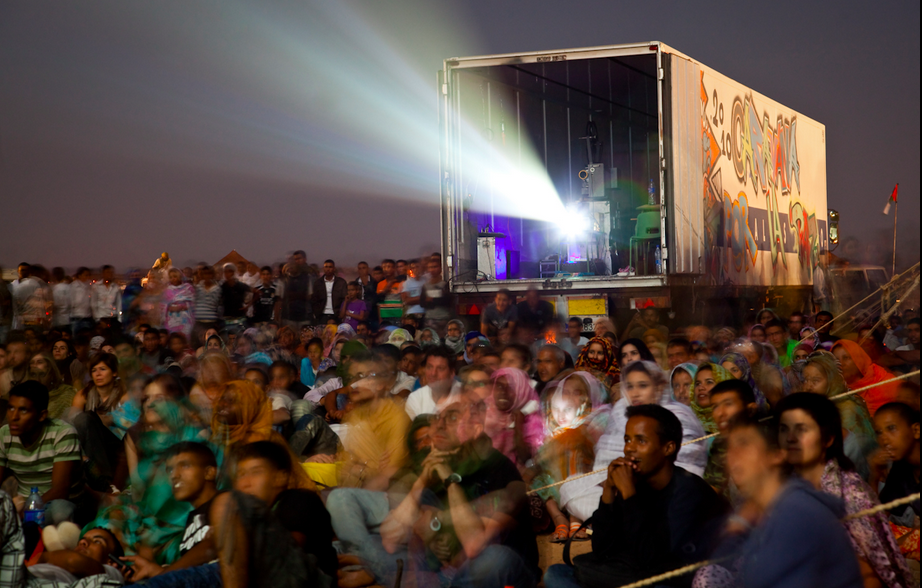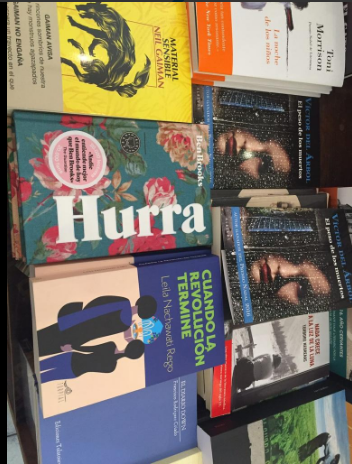
Sahwari attendants to the festival, and their international guests, during one of the screenings. Source: Fisahara´s official website
For a few months now, I´ve been working with a team of journalists, artists and movie makers on the organization of FISAHARA – Festival Internacional de Cine del Sahara, that will take place between October 8-13. I have to admit that I didn´t not know so much about the festival until I joined the communications team this spring, although it has been going on for 10 years. In 2010, The Guardian named it “the world´s most remote film festival.”
FiSahara takes place in Dakhla, the most isolated of four camps, 130 miles from the nearest town and home to around 30,000 Saharawi refugees. There are no paved roads, no sources of water, no vegetation and in summer, temperatures can reach 50°C. And yet once a year a multiplex-sized screen rolls up on the side of an articulated lorry, a tented village springs up in the centre of the camp and hundreds of actors, directors and film industry insiders fly in from around the world for a programme of more than 30 films, some made by the refugees themselves.
This year, the festival will aim to reach out to an even wider audience in order to bring attention to the forsaken struggle of the Saharawi people. It also seeks to frame this struggle within the regional movement that has pushed millions of citizens of the Middle East and North Africa to demand freedom, justice and dignity since 2011. In fact, many find the root of the so-called Arab Spring in the Western Sahara, back in 2010, when the indigenous Saharawi population demonstrated against the occupying Moroccan authorities. Their demonstrations were violently put down, and eleven Saharawis were killed.
Despite the increasing threats, violence and suffering the region faces, the struggle against oppression that was at the core of the 2011 mobilizations remains, more than ever, a legitimate one. Creating and fostering bonds and networks between civil activists in the Sahara, Palestine, Syria, Egypt, Tunisia and the rest of the MENA region is crucial to strengthen citizen voices against tyranny, whether this comes from fascist and so-called secular regimes or islamist threats. Many journalists, activists and movie makers from the region will join this festival´s edition. We are very proud of all of them, but there is one who is particularly inspiring.
Nadir Bouchmouch is a Moroccan activist who has been very involved in the February 20 movement since early 2011. His 40-minute documentary, Makhzen and Me, which shows the counter-attack by the Moroccan authorities as a response to the popular uprising, will be featured at the festival. Last week, he wrote the following message on his facebook page, which speaks louder than anything we may add:
This festival is particularly meaningful for me to go to because I have had enough of self-censoring myself on the Western Sahara issue. The refugees I will be working with are refugees because my country, Morocco, is occupying their land. This is why it is particularly symbolic that I am working with Guy Davidi, an Israeli who supports the Palestinian cause. I always hope more Israelis take action to support Palestinians, but how can I not expect the same from myself regarding Western Saharans? It’s almost the same issue: an occupier and an occupied, a settler-population and a refugee population… I was brainwashed for years to believe the Western Sahara was Moroccan, but says who? King Hassan II? Our state-owned TV channels? Our government-controlled history textbooks?
I will no longer be an accomplice, through silence, with the Moroccan regime of occupation of the Western Sahara. From here on, I will be loyal and consistent to my belief in democracy, human rights and equality for all. I will condemn the occupation and I will be a voice within Moroccan society that will choose to no longer be silent nor afraid. #FreeWesternSahara



Leave a Reply